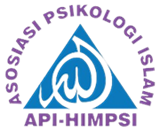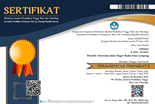Self-Awareness Management and Student Learning Understanding Case Study in Politeknik Negeri Sriwijaya
Abstract
Emotional intelligence has become an important part of achieving learning outcomes and has been proven by previous research. Self-awareness is part of emotional intelligence. Self-awareness student must be managed because it will contribute to the understanding of the student learning outcomes. So students can compete in facing a dynamic environment. This research study was to collect data and insights about student learning outcomes based on the level of self-awareness. The hypothesis of this study is that students who achieve good learning outcomes are students who have good self-awareness and have a positive influence on student learning outcomes. The research sample consisted of 30 students of Sriwijaya State Polytechnic, Bukit class and 11 students of Sriwijaya State Polytechnic, Banyuasin Class. Self-awareness and student learning outcomes were measured by a questionnaire with a Lickert scale. Then, the data were analyzed through SPSS software. The result is that self-awareness has a significant influence on student learning outcomes.
Keywords
Full Text:
PDFReferences
Elias, M. J., Ubriaco, M., Reese, A. M., et al. (1992). A Measure For Adaptation To Problematic Academic And Interpersonal Tasks Of Middle School. Journal of Middle School Psychology, 30, 41–57.
Goleman, D. (1995). Emotional Inteligence: Why it can matter more than IQ. New York: Bantam Books.
Goleman, D. (1996). Emotional intelligence. Why it matters more than IQ. Learning, 24(6), 49–50.
Goleman, D. (2001). Emotional Intellegence: Kecerdasan Emosional Mengapa EI Lebih
Penting Daripada IQ. Jakarta: PT Gramedia Pustaka Utama.
Higgs, M. and Dulewicz, V. (1999). Making Sense of Emotional Intelligence. Berkshire:NFER-Nelson Publishing Company.
Holahan, C. K. and Sears, R. R. (1995). The Gifted Group In Later Maturity. Stanford: Stanford University Press.
Nickerson, R.S. (1985). Understanding. American Journal of Education, 93(2), 201-239.
Rahmawati, R, dkk. (2022). Hubungan Self Awareness Dan Motivasi Belajar Dengan Hasil Belajar Peserta Didik Pada Mata Pelajaran Biologi. Jurnal Bioterdidik: Wahana Ekspresi Ilmiah. 10(2),222-231.
Rini, Mei, Maskun, Ekwandari. (2018). “Hubungan Kesadaran Diri Dengan Hasil Belajar
Sejarah Peserta Didik SMA Negeri 1 Pagelaran.” 5(9).
Sabariah. (2013). Hubungan Kecerdasan Emosi Dengan Penpemahaman Akademik Dalam Kalangan Pelajar-Pelajar Kolej Vokasional Kementerian Pelajaran Malaysia (KVKPM). Universiti Tun Hussein Onn Malaysia. Malaysia.
Saunders, M., Lewis, P., and Thornhill, A. (2007). Research methods for business students. London: FT/Prentice-Hall.
Sekaran, U. (2003). Research methods for business. New York, NY: John Miley and Sons: Inc.
Sihaloho, P. (2019). Hubungan Antara Self Awareness Dengan Deindividuasi Pada
Mahasiswa Pelaku Hate Speech. Jurnal Ilmiah Mandala Education. 5(2):114–23.
Widarjono, A. (2019). Statistika Terapan dengan Excel dan SPSS (ed2). Yogyakarta:UPP STIM YKPN.
Wechsler, D. (1940). The Measurement of Adult Intelligence. The Journal of Nervous and Mental Disease 91(4):p 548, April 1940.
Whetten, D.A. and Cameron, K.S. (2011). Developing Management Skills. New Jersey. Pearson education, Inc.
Yahaya, A. Mo Lee, G, dkk. (2014). Hubungan antara Dimensi Kecerdasan Emosi dengan Penpemahaman Akademik Pelajar. Malaysia: Universiti Teknologi Mara (Melaka) Press.
DOI: http://dx.doi.org/10.24042/ajp.v6i1.17480
Refbacks
- There are currently no refbacks.
Copyright (c) 2023 Rizal Afif Abdullah Napitupulu











